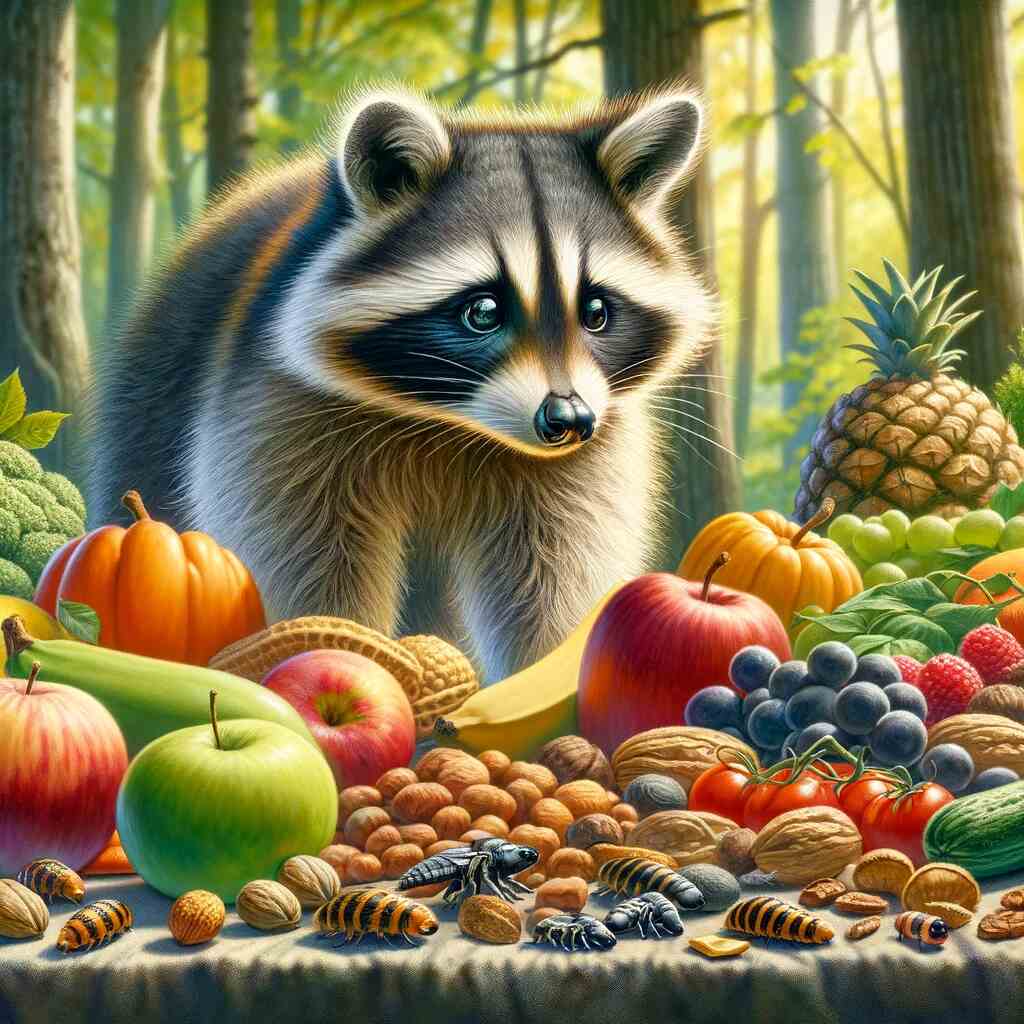Raccoons, with their masked faces and agile, curious nature, have become a common sight in many urban and suburban areas. These adaptable creatures are known for their omnivorous diet, which enables them to thrive in a wide range of environments.
In this comprehensive article, we will dive into the intriguing raccoons’ dietary habits, exploring what they eat, why they eat it, and the ecological role they play in their ecosystems.
The Raccoon: A Versatile Omnivore
Raccoons (Procyon lotor) are medium-sized mammals native to North America. They are part of the Procyonidae family, which includes other species like coatis and kinkajous. These animals are celebrated for their distinctive appearance, characterized by their gray fur, bushy tails adorned with dark rings, and the iconic black mask-like markings around their eyes.
One of the most fascinating aspects of raccoons is their remarkable adaptability to a variety of habitats, ranging from forests and wetlands to urban areas and agricultural fields. This adaptability extends to their diet, making raccoons opportunistic omnivores. They are not picky eaters and will consume a wide array of foods to meet their nutritional needs.
The Raccoon’s Diet: A Menu of Opportunity
Raccoons are often described as “opportunistic feeders” because they are not tied to a specific food source or hunting method. Instead, they take advantage of whatever food resources are available to them in their environment. Let’s explore the diverse components of their diet:
1. Fruits and Vegetables
Raccoons are known to consume various fruits and vegetables when they are in season. They have a particular fondness for fruits like berries, apples, grapes, and cherries. In gardens and orchards, raccoons can be a significant nuisance as they feast on ripe crops.
2. Invertebrates
Insects and other invertebrates are a crucial part of a raccoon’s diet. These animals are proficient hunters when it comes to foraging for insects, earthworms, snails, and crayfish. Their dexterous paws allow them to overturn rocks and logs to find hidden prey.
3. Small Mammals
Raccoons are skilled predators of small mammals, including mice, rats, and voles. They are opportunistic hunters, taking advantage of any available rodent populations. This behavior can help control pest populations in certain ecosystems.
4. Fish
Raccoons are excellent swimmers and will readily catch fish, frogs, and other aquatic creatures when the opportunity arises. Their agile hands allow them to reach into the water and grasp their prey, making them efficient aquatic hunters.
5. Birds and Eggs
Raccoons are known to raid bird nests, both for eggs and young birds. Their climbing abilities make it relatively easy for them to access nests in trees or on cliffs. They are also known to scavenge on the remains of dead birds.
6. Carrion
Like many scavengers, raccoons are not averse to dining on carrion. They will feed on the carcasses of animals they come across, further demonstrating their adaptability and role in cleaning up their environment.
7. Human Food
Raccoons have a notorious reputation for raiding garbage cans and dumpsters in urban areas. Their ability to manipulate lids and open containers with their nimble hands makes them efficient scavengers of human food waste.
8. Plant Material
While raccoons primarily consume animal matter, they are not exclusively carnivorous. They occasionally eat plant material, such as nuts, seeds, and acorns, particularly during the fall when these items are abundant.
9. Pet Food
Raccoons are not shy about helping themselves to pet food left outside. This behavior can lead to conflicts with homeowners, as raccoons can be quite persistent when it comes to accessing food sources.
Why Do Raccoons Eat What They Eat?
Understanding why raccoons consume such a varied diet involves considering their biology, behavior, and ecological role. Here are some key factors that shed light on their dietary choices:
1. Omnivorous Adaptation
Raccoons’ omnivorous diet is an evolutionary adaptation that enhances their survival in a changing environment. Being opportunistic eaters means they can take advantage of seasonal food availability and resource fluctuations.
2. Dietary Flexibility
The raccoon’s ability to switch between different food sources allows them to survive in a wide range of habitats. They are not reliant on a single food type, making them resilient in diverse ecosystems.
3. Seasonal Availability
Raccoons are attuned to the seasons and adjust their diet accordingly. They rely on fruits and vegetables during the warmer months when these foods are abundant, while turning to more protein-rich sources like small mammals and birds during colder months.
4. Energy Requirements
The energetic demands of raccoons vary throughout the year, especially during breeding and rearing young. Their diet must provide sufficient energy, protein, and nutrients to meet these needs.
5. Nutritional Value
Raccoons are selective in their food choices, often preferring items that offer the greatest nutritional value for the least effort. This helps them maximize their calorie intake and maintain their body condition.
6. Ecological Role
Raccoons play a vital role in their ecosystems as both predators and scavengers. By consuming various prey species and carrion, they help regulate population numbers and contribute to nutrient cycling.
7. Foraging Behavior
Their keen sense of smell, dexterous paws, and sharp claws enable raccoons to forage effectively. They can uncover insects, manipulate objects, and access hard-to-reach food items with ease.
Urban Raccoons: A Unique Diet
As human populations continue to expand into raccoon habitats, these creatures have learned to adapt to urban environments. Urban raccoons have access to a different set of food resources compared to their counterparts in more natural settings. Here are some aspects of their diet unique to urban raccoons:
1. Garbage and Human Food
One of the most significant dietary changes for urban raccoons is their reliance on human-generated food sources. They become adept at raiding trash cans, dumpsters, and compost piles, feasting on discarded human food, leftovers, and organic waste.
2. Pet Food
Urban raccoons often find easy pickings in outdoor pet food dishes. They may visit homes with outdoor cats or dogs, helping themselves to kibble left outside.
3. Bird Feeders
Raccoons are notorious for raiding bird feeders. They can climb trees, fences, and poles to reach hanging feeders, making them a source of frustration for many bird enthusiasts.
4. Gardens and Crops
Urban gardens and agricultural fields can be tempting for raccoons. They may devour crops like corn, melons, and tomatoes, causing damage to local agriculture.
5. Ponds and Lakes
Raccoons in urban areas often take advantage of ornamental ponds and lakes found in parks and residential areas. They hunt for fish, frogs, and other aquatic life, contributing to the balance of these artificial ecosystems.
The Role of Raccoons in Ecosystems
Raccoons are not just opportunistic eaters; they also play a significant role in the ecosystems they inhabit. Here are some of the ecological contributions of raccoons:
1. Seed Dispersal
Raccoons unwittingly aid in seed dispersal by consuming fruits and then depositing seeds in new locations through their scat. This process helps in the regeneration of plant species and maintains biodiversity.
2. Pest Control
Raccoons help control pest populations by preying on insects, rodents, and other small mammals. In agricultural settings, they can help reduce the need for chemical pest control methods.
3. Carrion Cleanup
Raccoons play a crucial role in cleaning up carrion, helping to prevent the spread of diseases and recycle nutrients back into the ecosystem.
4. Soil Aeration
Their habit of digging for invertebrates and other food items can lead to soil aeration, potentially benefiting plant growth and soil health.
5. Predator-Prey Relationships
Raccoons are both predators and prey, serving as a part of the intricate web of predator-prey relationships in their ecosystems. Their presence influences the behavior of other species, such as nesting birds that must protect their eggs from raccoon predation.
Raccoons as Nuisance Wildlife
While raccoons undoubtedly play essential roles in their ecosystems, they can become nuisance wildlife in urban and suburban areas. Their resourcefulness and adaptability can lead to conflicts with humans. Here are some common issues associated with raccoons:
1. Property Damage
Raccoons are notorious for causing damage to gardens, crops, and property. They may dig up lawns in search of grubs or nest in attics and crawl spaces.
2. Disease Transmission
Raccoons can carry various diseases, including rabies, which can pose a risk to both humans and pets. Avoiding contact and securing trash can help reduce the spread of these diseases.
3. Garbage Raids
One of the most common grievances with raccoons in urban areas is their habit of rummaging through trash cans. This not only creates a mess but also leads to a constant battle between homeowners and raccoons.
4. Pet Conflicts
Raccoons can pose a threat to outdoor pets, especially small dogs and cats. Encounters can lead to injuries or the transmission of diseases.
5. Bird Feeder Damage
For bird enthusiasts, raccoons can be a major headache as they often damage bird feeders and scare away songbirds.
Mitigating Conflicts with Raccoons
Managing raccoon conflicts requires a combination of prevention and humane practices. Here are some strategies to minimize interactions and maintain a peaceful coexistence:
1. Secure Trash Bins
Use raccoon-resistant trash cans with locking lids or bungee cords to keep raccoons out of your garbage.
2. Remove Outdoor Food Sources
Avoid leaving pet food outdoors, and clean up any fallen fruit from trees or berry bushes. Secure bird feeders or bring them inside at night.
3. Seal Entry Points
Inspect your home for potential raccoon entry points, and seal any openings. This includes gaps in the roof, vents, and chimneys.
4. Install Motion-Activated Lights and Sprinklers
Raccoons are nocturnal creatures, and motion-activated lights or sprinklers can deter them from your property.
5. Use Repellents
Commercial repellents or homemade solutions like ammonia-soaked rags can be used to deter raccoons from specific areas.
6. Contact Professionals
If you are unable to manage a raccoon problem on your own or if you suspect a raccoon is sick or injured, contact local wildlife authorities or pest control professionals for assistance.
Conclusion
Raccoons, with their diverse and adaptable diet, are remarkable creatures that have successfully adapted to various ecosystems, including urban areas. Their omnivorous nature allows them to exploit a wide range of food sources, from fruits and vegetables to invertebrates, small mammals, and even human-generated waste.
While raccoons may sometimes be viewed as nuisance wildlife due to their interactions with humans, it’s essential to remember their valuable ecological roles. They help maintain biodiversity, control pest populations, and contribute to nutrient cycling in their ecosystems.
To coexist peacefully with raccoons in urban areas, it’s crucial for humans to take steps to mitigate conflicts and avoid attracting these clever and resourceful creatures. By doing so, we can strike a balance that allows raccoons and humans to share the same spaces without undue disruption. Ultimately, understanding raccoon dietary habits and their place in the natural world can lead to more harmonious interactions between humans and these fascinating omnivores.










